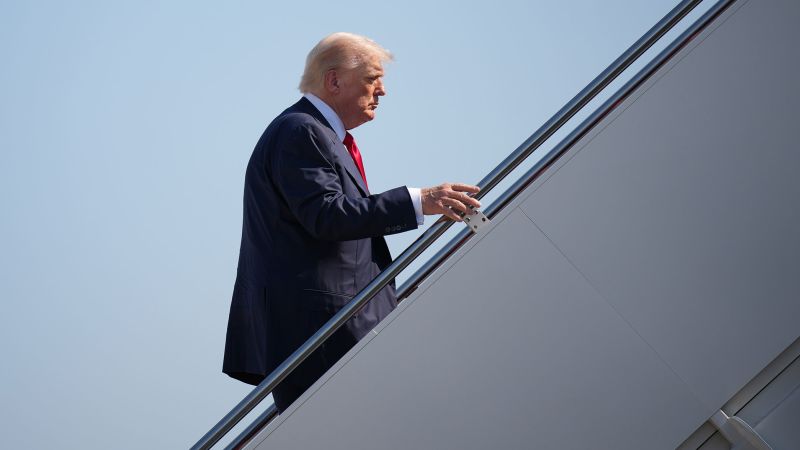Ezra Klein’s podcast opens with a humorous yet poignant illustration of the ongoing culture of conspiracy theories that pervade contemporary political discourse. In his joke, Klein depicts a conspiracy theorist who, upon arriving in heaven, is greeted by God. The theorist, eager to uncover the truth behind one of America’s most infamous historical events, asks who was responsible for the assassination of President John F. Kennedy. God replies with clarity: Lee Harvey Oswald. The punchline comes as the theorist mutters that this truth reveals even deeper layers of conspiracy, encapsulating the never-ending quest for more hidden truths that seem to lurk behind official narratives.
This anecdote humorously yet effectively reflects the conundrum Donald Trump faces in the wake of the Jeffrey Epstein scandal. Despite his attempts to divert attention away from Epstein’s controversial relationships and the overall implications of his actions, Trump finds that every maneuver only intensifies the scrutiny surrounding him. The close association between Trump and Epstein, particularly their shared connections within elite circles, raises not just eyebrows but serious questions.
Public opinion reveals a significant level of skepticism regarding transparency. A recent Reuters/Ipsos poll indicates that an overwhelming 69% of Americans, including a surprising 62% of Republicans, suspect that the government is concealing Epstein’s alleged client list. This belief is not without merit, as the myriad questions surrounding Epstein’s wealth, his access to influential networks, and the questionable circumstances surrounding his death in custody raise grave concerns. How Epstein amassed such wealth, and what remains hidden in the extensive digital files seized from his residences, are just a few among many unanswered questions.
Trump’s handling of conspiracy theories has evolved over many years. Beginning with his promotion of the “birther” narrative aimed at Barack Obama, Trump has both exploited and benefited from a growing tide of conspiracy theories. This trend, often pointing to a so-called “deep state” implicated in various cover-ups, gradually eroded trust in established institutions. Now, ironically, Trump occupies the very seat of power where these secrets reside. His refusal to disclose them has only compounded conspiracy theorist skepticism and suspicion about his actions and intents.
The fascination with conspiracy theories has longstanding roots in American history, with citizens often feeling marginalized by distant power centers. Historian Richard Hofstadter noted this paranoid style prevalent in American politics, emphasizing recurring fears targeting various groups from Freemasons to communists. The echo of these fears was encapsulated in the activities of Senator Joseph McCarthy during the 1950s, who charged that infiltrators were undermining the American government.
Fast forward to the present, and the landscape has shifted significantly. In her 2019 book “Republic of Lies,” journalist Anna Merlan outlines how conspiracy theories have moved from the fringe into the mainstream of political and cultural dialogues, implicating notable figures who amplify these conspiracies, including Trump himself. Having risen to power while spinning narratives of election fraud and birtherism, Trump has made the likes of Alex Jones and Kash Patel household names, further blurring the lines between fact and fiction in political discussions.
However, Trump’s predicament is unique. Having spent years rallying his base against the perceived elitism and secrecy of the state, he now leads that very state, tasked with unveiling truths hidden beneath layers of bureaucracy. His administration has made efforts to release files related to high-profile assassinations, yet the absence of clear evidence pointing to conspiracies remains a difficult point to confront. Admission of prior elusiveness from previous administrations could undermine their credibility, pushing them to maintain a nonexistent narrative of transparency.
Trump’s adeptness as a politician is under scrutiny, particularly when his past relationship with Epstein is considered. In navigating the rising scrutiny, he resorts to diverting attention to other conspiracies—revisiting accusations against figures like Obama, Hillary Clinton, and Joe Biden, although these attempts carry a feeling of desperation.
On notable occasions, such as when numerous questions around Epstein arose, Trump’s engagement on social media surged, revealing his prolific activity. Meanwhile, figures like Patel stoke further curiosity, asserting the existence of a hidden vault of secrets within the FBI, suggesting that instead of focusing on Epstein, there are unfathomable conspiracies yet to be uncovered.
Ultimately, Trump’s vigorous responses to the Epstein scandal may exacerbate public distrust in institutions and fuel online radicalization, potentially fracturing the already polarized political environment in America. As he navigates this complex web of conspiracy, the dangers he undertakes might result in significant repercussions—perhaps not just for him, but for the broader political climate. The impending consequences of this situation may leave lasting scars, highlighting the precarious balance of political influence and public trust.











